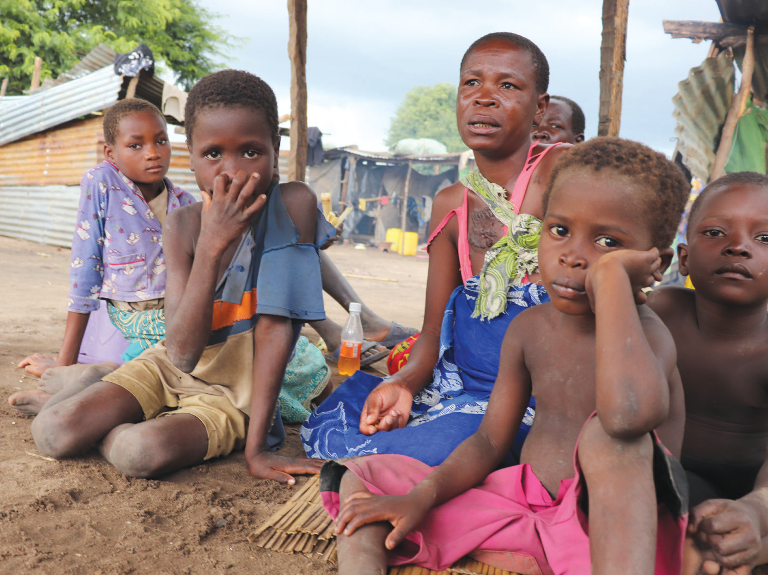Displaced village demands relocation
It’s time to leave! Demands for relocation are rising in Kanseche in Chikwawa, where floods caused by Tropical Storm Ana displaced an entire village and swept away three people who are still missing.
Some Shire Valley residents have long resisted calls for resettlement from disaster zones, but the community ripped by four devastating floods since 2015 says now it is time to move.

The cries echo in a congested, unsanitary camp where all 2 380 villagers took shelter on January 26 this year when they fled the floods that shattered 505 houses, leaving less than 15 standing albeit roofless and deserted.
The displaced community recalled that the rainstorm inundated Mwanza River, which broke its banks and ruined all households in Kanseche where the three missing are presumed dead.
“My firstborn, Rayford Banja, is certainly dead. He would have returned if he was still alive. The floods took him away alongside every valuable thing I had acquired,” said bereaved mother, Elizabeth Frank, 35, in an interview at the camp where the displaced scramble for one foul-smelling pit latrine. The mother of seven says life has lost its meaning since tragedy struck three weeks ago.
“I blame myself for not relocating in 2019 when floods destroyed some houses in the village. Now I’m looking forward to relocating to higher ground. I’ve nothing more to lose,” she declares.
Her son was washed away by Mwanza overflows after swimming downstream to deliver chancy foodstuffs to his two siblings who had been freezing in an overcrowded tree for almost six hours.
Frank recounted: “When Rayford saw packs of biscuits and Kamba puffs floating from a battered shop in the flooded village, he grabbed them and swam from the tree where he was nesting to take them to his brother and sister who were starving in another tree.
“Unfortunately, he couldn’t swim back. The oncoming flood swept him away.”
Boatmen took the woman and his remaining children to the camp where they sleep in the open even when it rains.
During the visit, she shared the heartbreak of parents and relatives of 20 flood victims declared missing by the Department of Disaster Management Affairs (Dodma).
“Losing everything is painful, but knowing that your son is most likely dead and spending three weeks without seeing his body or grave is torturous,” Frank lamented.
Every morning, she walks to the river which swallowed the first fruit of her womb, but returns to the camp in tears.
She has found a consoling friend in Rose Horace, 43, whose husband disappeared in a similar fashion after braving the rainstorm in search of higher ground where his family could safely perch.
“My husband, aged over 70, was a brave man. He died searching for a safe place for us, but the water rose so suddenly that he didn’t return to take us to a graveside anthill he identified together with his cousin,” she looked back.
Eyewitnesses say the man was washed beyond the lush graveyard.
The tragedy left Horace with the challenge to raise six children singlehandedly.
Day and night, she says a prayer for the spouse gone with water.
So does Sarah Bakali, 31. Her four-year-old daughter, Abigail, fell from his shoulder into racing floodwater as she escaped the floods from the crocodile-infested river.
“I strapped my last-born baby, born last March, on the back and the missing girl on the shoulder and bag in both hands. Suddenly, I tripped and Abigail fell into the running river which had veered into the village. I know she is dead; she was too young to swim,” she narrated.
Bakali said “the flood surged in a blink of an eye”, leaving those trapped in its way with little time to flee.
The three women shared their agony at a communal meeting on Tuesday, a day before Dodma commissioner Charles Kalemba was scheduled to visit the crammed camps mostly sidestepped by relief efforts.
During the meeting, the displaced villagers and chiefs resolved to petition government for urgent resettlement away from the impoverishing floods.
Chikwawa district commissioner Ali Phiri told The Nation that the government would identify a safer settlement for the displaced if they really want to leave the low-lying areas.
In an interview, Kalemba described the devastation seen in the worst-hit district and the rest of the Shire Valley as a call for strict enforcement of laws that prohibit settling in known disaster zones.
He explained: “We sympathise with the affected people. This is why we have been asking them to move to higher grounds.”
According to Dodma, Tropical Storm Ana has affected about 870 000 people from over 200 000 families. Some 38 people have been confirmed dead, 20 missing and 23 000 displaced.





